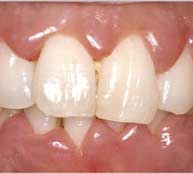 The medical meaning of hyperplasia is abnormal growth of cells. But, in contrast to cancer, here the cells behave normally without showing any disruption in their working mechanism. When such a condition affects the soft tissues of the mouth, it is known as gingival hyperplasia. The gums become enlarged posing difficulty in eating. There are several causes for the excess growth of normal cells in the gums. This article tries to gain further insight on this subject.
The medical meaning of hyperplasia is abnormal growth of cells. But, in contrast to cancer, here the cells behave normally without showing any disruption in their working mechanism. When such a condition affects the soft tissues of the mouth, it is known as gingival hyperplasia. The gums become enlarged posing difficulty in eating. There are several causes for the excess growth of normal cells in the gums. This article tries to gain further insight on this subject.
Symptoms of Hyperplasia in the Teeth Gums:
- Bleeding
- Redness
- Swelling
- Aching
- Tenderness
- Infection in the gums
- Severe discomfort in opening the mouth
- Septic in the gum lines
Is Gingival Hyperplasia an Indicator of Acute Leukemia Cancer Types
Although normal changes in the body like onset of puberty, pregnancy, trauma to the gums, and deficiency of Vitamin C and side effects of certain medications can lead to the appearing of these above mentioned signs, the condition can also indicate present of a hidden and serious condition.
The possibility of development of cancer cannot be ruled out at any stage of diagnosis. It is because abnormal growth of cells in any part of the body is the fundamental characteristic associated with this ailment.
Unfortunately, hyperplasia in gums is the first sign of the bone marrow cancer, acute myeloblastic leukemia (AML). Research studies carried out by Dreizen and colleagues have found that 66.7 percent patients with swelling of the gums suffered from acute monocytic leukemia. 18.5 percent patients with this gum complication had acute myelomonocytic leukemia.
The term acute here refers to the fact that the cancer spreads very rapidly into the body, proving fatal after the signs become apparent. Medical intervention is the immediate need of the hour in order to treat this cancer type in such a situation. Only awareness on the subject can prove handy in early diagnosis and commencement of the treatment for this dreadful ailment.
The treatment of this condition is case-specific and completely depends on the underlying cause revealed by the diagnosis. Some people are genetically susceptible to develop swelling in the gums due to excess growth of cells. But, there are some causes of this gum condition which are idiopathic. The term means any medical condition of unknown cause.
Diagnosis of the condition can begin from knowing the medical history of the patient. The doctor might be particularly eager to know whether the patient already suffers from any immune system compromised ailment like diabetes or not.
It is followed by a thorough check up of the mouth and gums especially. If the doctor suspects any abnormality in diagnosis, biopsy of the soft tissues can be carried out. The process involves cutting and isolating some tissues of the suspected location of the body. They are placed under powerful microscope to identify the cells growing abnormally in the gums leading to this condition. This technique also confirms presence of cancerous cells if any.
Treatment of Gingival Hyperplasia:
Mild to moderate signs of the condition can be treated by prescribed medications, following certain instructions of the dentist on diet and by adjusting some lifestyle related aspects.
Early diagnosis completely rules out the possibility of surgical intervention. But, if the state of the gum is serious, surgery is an effective treatment modality. If cancer is the cause of hyperplasia in the gums, standard treatments like chemotherapy and radiation therapy under strict medical supervision can be applied.
